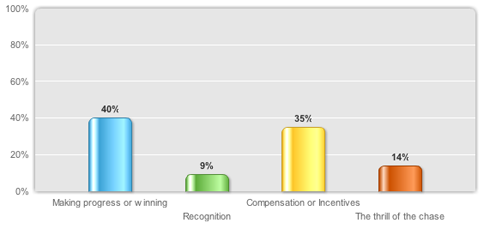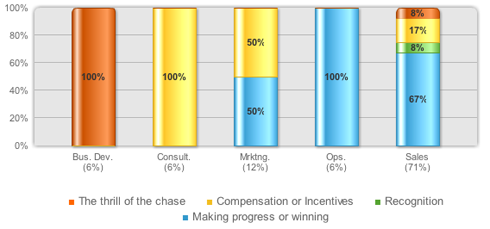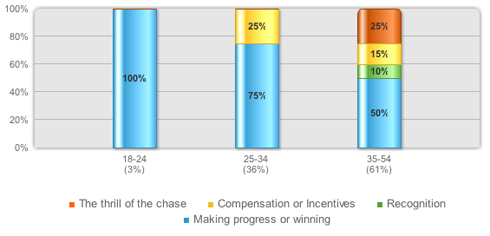What motivates a salesperson – the results are in!
May 27, 2010
Regular readers will recall that I've been pleased to republish a number of guest blogs from Donal Daly of our partner the TAS Group. Here's an article that he first published a couple of months back on the Sales20Network that I am sure you'll find fascinating.
Over to you, Donal:
"There is much debate about what makes a good sales person, or indeed whether you can actually ‘make’ a good sales person. The debate of selling as a science or art continues to elicit much passionate discourse. What’s the role of sales training? Does how the sales person is compensated make a big difference? Does marketing drive sales or sales guide marketing? Why are there no (or few) professional qualifications for sales people? How come there are no standard measures? How can I get the most out of the sales team I have?
Sales fuels growth – and many reports have been commissioned on how to identify, hire, fire, coach or motivate a sales team to produce that growth. Depending on the audience, the answer to ‘What motivates a sales person?’ varies. Well, the survey results are in, and the answer is clear. But the important action for you to take right now is not to sit back and go “Hmm, that’s interesting”, but rather to think about what it means to your organization.
But first, the background …
I conducted a simple poll of the LinkedIn membership to answer a simple question:
What motivates sales people?
- Compensation or Incentives
- The thrill of the chase
- Making progress or winning
- Recognition
As I write this, there were 129 respondents, and though that is not a huge sample size, my experience with these kind of surveys would suggest that the percentages don’t change much after the first 50 or so respondents – assuming you’re targeting a fairly homogeneous group. So, I’m pretty confident that the responses here are sufficiently representative.
As you can see from the chart below, the overall results from the survey would suggest that what keeps the sales professional fired up and motivated is tangible evidence of making progress (40% of respondents). ‘Compensation or Incentives’ is strong second (at 35% of respondents) , but you will see that the gap increases when you look a little more closely.
Overall Results
Now, stop for a minute and think about how your organization provides you, or your sales team, with tangible evidence of progress. As the sales person progresses a sale, does sales management coaching measure progress against evidence of customer actions? Is it all about activity? Does the CRM system provide feedback to the user on the progress they are making – or is is just used for data entry to supply management with whatever reports they need.
When you further analyze the data, and look at if from the perspective of different job functions, you will see that from the sales professionals’ perspective, ‘Making progress or winning’ (at 67%) is the clear leader in the motivation stakes. It’s interesting to note that Consultants have it so wrong. Remember the old adage that says “Those who can, do; and those who can’t consult.” Be afraid – be very afraid.
Results by Job Function
As one of the respondents to the survey commented “So, maybe we’re not just money grabbing leaches after all.” Sales people, like everyone else, need to feel good about the job they do every day. Not every day is going to be a day where you close a deal. Sales is a profession peppered with rejection and disappointment, and it’s only those who have planned out their path to success, and have put in place a mechanism to measure progress against that plan, who can exhibit the necessary resilience to make success a pattern.
When we (The TAS Group) ask our existing customers what they like about the Dealmaker Sales Performance Automation platform, one of the most common answers we get from individual contributors and sales management alike is “We can always see when we are making headway. It’s not just like the CRM black-hole.”
One of the most interesting findings from this poll was the variances in response across age groups. Is this representative of an evolving shift in values? It is a sign of the impetuosity or impatience of youth – in this increasingly interrupt-driven environment? As you can see in the chart here, younger respondents want feedback – and they want to see progress, and they want to see it now.
Results by age categories
I found the results of this survey to be at once interesting and uplifting. For those who are open to interpreting it this way – it removes, or at least dilutes, the stereo-type of the snake-oil salesman. Sales people, like everyone else, want to feel good about themselves, every day, one small win at a time.
We shouldn’t ignore this when we think about how we manage, and might perhaps consider what one thing we can change to leverage this inherent attribute to accelerate revenue growth."
So - if you're a sales manager, how do these results relate to your experience? And if you're a sales person, do these findings reflect the way you feel? Or is something else motivating you?
One more thing: if you would like to learn more about how sales process equals sales success, you can complete a form to down load the TAS Group's recent white paper on the subject here.





Comments